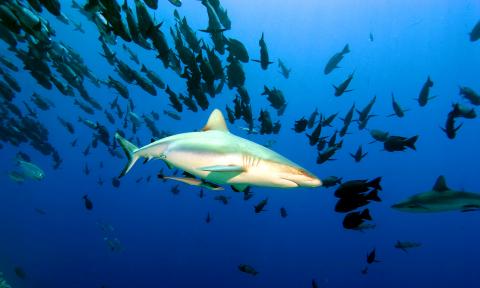The shark — feared as a bloodthirsty killer and hunted to the brink of extinction in many parts of the world — has found a passionate champion in the tiny Pacific nation of Palau.
With just one aging patrol boat policing an area of ocean roughly the size of France, Palau says it has still managed to make significant inroads curbing the illegal fishing that threatens the marine predators’ survival.
The country declared the world’s first shark sanctuary in September 2009, banning shark fishing in its exclusive economic zone, which covers almost 630,000km2 of the northern Pacific.

PHOTO: AFP
Palau Shark Sanctuary founder Dermot Keane, an Irishman who dedicated himself to saving the animals after first visiting the archipelago in 1995, said foreign fishing vessels hunting shark were once common in Palau waters.
The trade feeds Asia’s appetite for shark fin soup, a delicacy that has increased in popularity as the region’s wealth has grown, putting pressure on shark populations across the globe, Keane said.
Shark fishing commonly involves a practice known as finning that entails hacking the fins off captured sharks then throwing their bodies back into the sea to die.
“When I first came here, there were 50 or 60 shark boats working the waters,” Keane said. “They had shark fins hanging from the rigging.”
“Not only was it visually offensive for someone who came here as a tourist to scuba dive, the smell was pretty awful too. The sight of shark fins laid out to dry on the boats was not a positive image for Palau,” he said.
The Pew Environment Group estimates up to 73 million sharks are killed annually for their fins, which fetch up to US$100 a kilogram on the black market.
It says sharks are slow to reproduce, making them unsuitable for commercial fishing.
Keane, who now helps run a diving business after moving to Palau permanently in 1997, said that as top predators sharks had a vital ecological role and the country was determined to protect the 130 species found in its waters.
“We’re seeing less and less of the pelagic [deep water] sharks,” he said. “With their removal an unbalanced food chain results, changing the way the natural environment functions.”
The Irishman began campaigning to halt finning in the late 1990s and hit upon the idea of a shark sanctuary after finding many members of the public found gruesome images of mutilated sharks too confrontational.
“It was very much a blood and guts message of showing people pictures of sharks and fins and trying to explain what was going on,” he said. “At the same time, through my work, I was trying to promote Palau as a tourist destination and I was concerned I was working against myself.”
“So I started looking for a way to save sharks which was positive and that’s how I arrived at the idea,” he said.
Keane admitted there was initially skepticism about offering protection to a predator many seafaring communities regard not only as a deadly threat to their own lives, but also as competition for fish stocks.
“At first, if you were to press the locals about whether they were for or against it [shark finning], most of them, even though they weren’t directly involved in it would say ‘never mind the sharks, they take our fish,’” he said.
Since then, attitudes have changed in the nation of about 21,000 people, making it one of the world’s leading advocates for shark preservation.
Palauan President Johnson Toribiong has repeatedly raised the plight of sharks at the UN, citing studies that show the predators have far greater value as tourist attractions than as a commercial catch.
“The need to protect sharks outweighs the need to enjoy a bowl of soup,” Toribiong said on the sanctuary’s first anniversary. “These creatures are being slaughtered and are at the brink of extinction unless we take positive action to protect them.”
While resources to police the sanctuary are scarce, Thomas Tutii from Palau’s Marine Law Enforcement Division said foreign vessels were getting the message and there had been no finning arrests for more than a year.
“We can’t completely stop illegal shark fishing, but the declaration has been effective,” he said. “We haven’t seen shark fins on board the foreign fishing vessels and they seem to be complying and they are more conscious that they’re not allowed to fish for shark.”
Palau’s move to protect its sharks has prompted other nations, including the Maldives and Honduras, to establish similar sanctuaries.
Richard Brooks, an underwater photographer in Palau, said the sanctuary had helped educate the public that the misunderstood creatures should be respected, not feared.
“They’re a natural part of the eco-system and removing any part of the eco-system, it will change and it will have a domino effect,” he said. “They are actually more scared of humans, than we are of them.”

BEIJING FORUM: ‘So-called freedom of navigation advocated by certain countries outside the region challenges the norms of international relations,’ the minister said Chinese Minister of National Defense Dong Jun (董軍) yesterday denounced “hegemonic logic and acts of bullying” during remarks at a Beijing forum that were full of thinly veiled references to the US. Organizers said that about 1,800 representatives from 100 countries, including political, military and academic leaders, were in Beijing for the Xiangshan Forum. The three-day event comes as China presents itself as a mediator of fraught global issues including the wars in Ukraine and Gaza. Addressing attendees at the opening ceremony, Dong warned of “new threats and challenges” now facing world peace. “While the themes of the times — peace and development —

Venezuela on Saturday organized a day of military training for civilians in response to the US deployment in the Caribbean, and amid new threats from US President Donald Trump. About a month ago, Washington deployed warships to international waters off Venezuela’s coast, backed by F-35 jets sent to Puerto Rico in what it calls an anti-drug and anti-terrorism operation. Venezuelan Minister of Defense Vladimir Padrino Lopez has accused Washington of waging “undeclared war” in the Caribbean, after US strikes killed over a dozen alleged drug traffickers off his country’s coast. Caracas also accused the US of seeking regime change, and

BRIBERY ALLEGATIONS: A prosecutor said they considered the risk of Hak-ja Han tampering with evidence to be very high, which led them to seek the warrant South Korean prosecutors yesterday requested an arrest warrant for the leader of the Unification Church, Hak-ja Han, on allegations of bribery linked to the country’s former first lady and incitement to destroy evidence. The move came a day after the 82-year-old was questioned over her alleged role in bribing former first lady Kim Keon-hee and a lawmaker. Founded in 1954 by her late husband, Sun Myung Moon, the Unification Church has long been the subject of controversy and criticism, with its teachings centered on Moon’s role as the “second coming” and its mass weddings. Followers are derisively referred to as “Moonies.” However, the church’s

‘MURDER’: The US has not provided proof that boats it has struck were trafficking drugs, and a Venezuelan official said it was a crime against humanity that must be investigated Venezuela on Friday accused the US of waging an “undeclared war” in the Caribbean and called for a UN probe of US strikes that have killed more than a dozen alleged drug traffickers on boats over the past few weeks. Washington has deployed warships to international waters off Venezuela’s coast, backed by F-35s sent to Puerto Rico in what it calls an anti-drug operation. “It is an undeclared war, and you can already see how people, whether or not they are drug traffickers, have been executed in the Caribbean Sea. Executed without the right to a defense,” Venezuelan Minister of Defense Vladimir